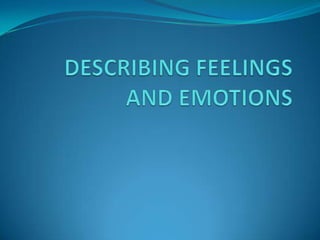
Adjectives Ending in '-Ing' and '-Ed
- 2. Many adjectives ending in ‘-ing’ describe the effect that something has on someone's feelings. Some adjectives ending in ‘-ing’ describe a process or state that continues over a period of time. Many adjectives ending in ‘-ed’ describe people's feelings.
- 3. Amazing frightening Annoying interesting Astonishing shocking Boring surprising Charming terrifying Confusing tiring Convincing welcoming Depressing worrying Disappointing Embarrassing Exciting
- 4. You use some ‘-ing’ adjectives to describe something that continues over a period of time Ageing Booming Decreasing Dying Existing Increasing Living Remaining
- 5. Many ‘-ed’ adjectives describe people's feelings. They have the same form as the past participle of a transitive verb and have a passive meaning. For example, ‘a frightened person’ is a person who has been frightened by something.
- 6. Amused Surprised Astonished Tired Bored Troubled Delighted Worried Depressed Alarmed Disappointed Excited Frightened Interested Satisfied Shocked
- 7. CHOOSE THE CORRECT FORM OF THE ADJECTIVE.
- 8. THAT PICTUREIS FRIGHTENING / FRIGHTENED I SAW THAT PICTURE AND I GOT FRIGHTENED / FRIGHTENING
- 9. WOW! THAT PICTURE IS REALLY EMBARRASING / EMBARRASED THE MAN IN THAT PICTURE LOOKS REALLY EMBARRASING / EMBARRASED
- 10. THAT IS VERY SURPRISING! / SURPRISED! SHE WILL BE VERY SURPRISING / SURPRISED
- 11. PRESENT PERFECT
- 12. PRESENT PERFECT We use the Present Perfect to say that an action happened at an unspecified time before now. The exact time is not important. You CANNOT use the Present Perfect with specific time expressions such as: yesterday, one year ago, last week, when I was a child, when I lived in Japan, at that moment, that day, one day, etc. We CAN use the Present Perfect with unspecific expressions such as: ever, never, once, many times, several times, before, so far, already, yet, etc
- 13. PRESENT PAST SIMPLE PAST PARTICIPLE DO DID DONE TO BE WAS /WERE BEEN MAKE MADE MADE LIVE LIVED LIVED SEE SAW SEEN RUN RAN RAN DRINK DRANK DRUNK WALK WALKED WALKED LISTEN LISTENED LISTENED TALK TALKED TALKED SPEAK SPOKE SPOKEN HAVE HAD HAD WRITE WROTE WRITTEN READ READ READ WATCH WATCHED WATCHED GO WENT GONE EAT ATE EATEN
- 14. The structure: I have been in Paris. Subject + have + verb in past participle + complement For I, you, they and we the auxiliary verb is HAVE. For He, she and it the auxiliary verb is HAS
- 15. For questions Have you been in Paris? Have / Has + subject + verb in past participle + complement Has she been in Paris? R/ = Yes, I have been in Paris. Yes, she has been in Paris.
- 16. Contractions HAVE NOT = HAVEN’T HAS NOT = HASN’T I HAVE = I’VE YOU HAVE = YOU’VE SHE HAS = SHE’S HE HAS = HE’S IT HAS = IT’S THEY HAVE = THEY’VE WE HAVE = WE’VE
- 17. More contractions I HAVE NOT = I’VE NOT = I HAVEN’T YOU HAVE NOT =YOU’VE NOT = YOU HAVEN’T SHE HAS NOT = SHE’S NOT = SHE HASN’T HE HAS NOT = HE’S NOT = HE HASN’T IT HAS NOT = IT’S NOT = IT HASN’T THEY HAVE NOT = THEY’VE NOT = THEY HAVEN’T WE HAVE NOT = WE’VE NOT = WE HAVEN’T
- 18. PRACTICE!!!! CREATE A SENTENCE WITH THE FOLLOWING: I / SEE / EL DIARIO DEL OTUN SHE / READ / THE BOOK IT / TO BE / DO WE / EAT / ALREADY YOU EVER / SEE / THAT MOVIE ? THEY / DRINK / THE SODA YET? YOU / READ / THE BOOK YET? SHE / GO / TO YOUR HOUSE YET? I / NOT DO / MY HOMEWORK.
- 19. GREAT JOB!!!! NEXT
- 20. INCORRECT! TRY AGAIN. GO BACK
- 21. GREAT JOB!!!! NEXT
- 22. INCORRECT! TRY AGAIN. GO BACK
- 23. GREAT JOB!!!! NEXT
- 24. INCORRECT! TRY AGAIN. GO BACK
